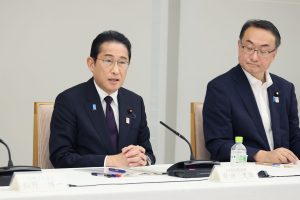Japan’s ruling party, the Liberal Democratic Party (LDP), is at the center of a financial misconduct scandal that threatens to drag down public approval ratings and paralyze the Kishida administration. The LDP’s largest political faction, named after assassinated former Prime Minister Abe Shinzo, is alleged to have failed to report as much as $700,000 from the ticket sales of fundraising events over a five year period. The money is alleged to have gone to an unmonitored slash fund.
The vast majority of 370 LDP lawmakers belong to one of five factions, with the Abe faction being the largest. The scandal has spread to Kishida’s faction, as well as the four other factions.
Last week Kishida stepped down as leader of the Kochikai faction – the LDP’s fourth largest political faction. He also ordered political factions to postpone any fundraising events for the holiday season. Tokyo prosecutors said they would launch investigations into individual politicians after the Diet session ended on Wednesday.
The controversial Unification Church scandal led to Kishida reshuffling his cabinet in September, clearing senior lawmakers with ties to the group, which critics label a cult. Now another cabinet shakeup is underway as Kishida scrambles to restore public trust.
Kishida has cleared his Cabinet of members of the Abe faction, including Chief Cabinet Secretary Matsuno Hirokazu, who is face of the government’s daily press briefings, as well as Minister for Economy, Trade, and Industry Nishimura Yasutoshi, Minister for Agriculture Miyashita Ichiro, and Minister for Internal Affairs Suzuki Junji. All four stepped down on Thursday to make room for Kishida to move on from the scandal. Another six vice ministers belonging to the Abe faction also resigned.
Nishimura apologized for the distrust the scandal has caused and said he would cooperate with authorities while Matsuno said he would not comment publicly on the issue. Both senior cabinet ministers are influential figures within the LDP. The party’s internal apparatus also saw a wave of resignations from Abe faction members, leading to an unusual situation where the party’s largest faction has no representation in leadership positions.
Hayashi Yoshimasa, who until the September reshuffle was Kishida’s foreign minister, was tapped to take over the role of chief Cabinet secretary. Saito Ken is the new economy minister, Sakamoto Tetsushi the new agriculture minister, and Matsumoto Takeaki the new internal affairs minister. All have previously held Cabinet positions, and Kishida said they were chosen for being “work-ready individuals with strong negotiation skills, execution capabilities and the ability to offer effective answers” to questions about government policy. Ironically, however, that means that several ministers Kishida sidelined three months ago in a bid to shore up his approval ratings are now back in his Cabinet.
Kishida told reporters on Thursday that Japan is at a “critical juncture.” The same could be said for his government, specifically.
For the last few months the Kishida administration has been plagued by the lowest level of public support since he came to power two years ago. The latest phone poll conducted by Japan’s public broadcaster NHK found that Kishida’s popularity has fallen 6 points since November, and now stands at 23 percent. At his peak Kishida enjoyed a 58 percent support rate.
Since then, he has been unable to quell voter dissatisfaction over the government’s response to rising prices, lagging wage hikes, slow economic recovery, and controversial LDP links with the Unification Church. The group is accused of financially ruining members, and Kishida is struggling to shake off public skepticism that he has ties to the church.
Lawmakers are expected to raise a certain amount of money for their faction as a membership requirement. They are expected to make money by selling entry tickets to companies, organizations, and various stakeholders to events held by factions. Fundraiser tickets cost roughly $150 each. The head of LDP political factions set individual ticket quotas based on the length of a lawmaker’s political tenure. If a lawmaker exceeds their quota, they are able to earn extra income referred to as “kickbacks.” By law, this excess money must be reported, but it was concealed by several dozen lawmakers.
The scandal is another setback for Kishida’s political agenda ahead of the Cabinet decision on the fiscal year 2024 budget. In a televised press conference on Wednesday Kishida expressed “extreme regret” and promised to “lead the fight in restoring the LDP in order to restore the public’s trust in politics.” Kishida has been under pressure to get to the bottom of the scandal. He said he would confirm the facts and answer all questions by the public. “We will listen to the critical voices of the people demanding political reform, and will intensively pursue direct discussions with party members,” he said.
Kishida is in political trouble and is facing one of the most challenging scandals in his leadership to date. While he does not need to call an election until October 2025, falling approval ratings could prompt LDP lawmakers to call for his resignation. If Kishida cannot stabilize support for the LDP and bounce back from the scandal, it will embolden potential challengers ahead of the LDP’s internal presidential election in 2024.

































